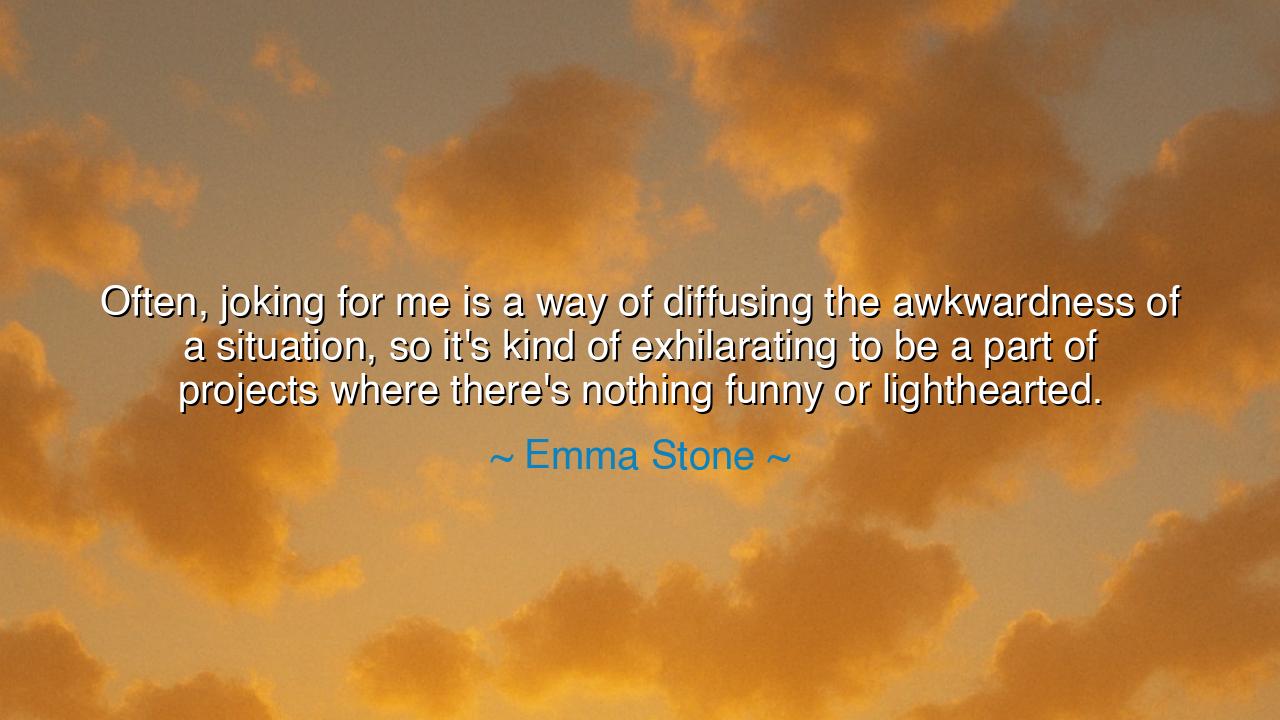
Often, joking for me is a way of diffusing the awkwardness of a
Often, joking for me is a way of diffusing the awkwardness of a situation, so it's kind of exhilarating to be a part of projects where there's nothing funny or lighthearted.






“Often, joking for me is a way of diffusing the awkwardness of a situation, so it’s kind of exhilarating to be a part of projects where there’s nothing funny or lighthearted.” — thus spoke Emma Stone, a woman whose art moves between laughter and sorrow, between charm and gravity. In these words, she unveils not merely the craft of an actress, but the confession of a soul that has long used humor as both armor and bridge. Her statement, humble in tone, carries an ancient truth: that laughter and silence are two languages of the same spirit — one shields the heart, the other exposes it.
To joke is, for many, not simply to entertain but to survive. The ancients knew this well. The philosopher Epictetus said that laughter is the freedom of those who refuse to be crushed by circumstance. When Emma speaks of diffusing awkwardness, she speaks of a gentle art — the turning of tension into air, of discomfort into connection. Humor, in this sense, becomes a shield of grace: not to avoid truth, but to make truth bearable. Like a flame cupped in the hands, it gives warmth without consuming. Yet she also reveals another side: that to step into a space where laughter cannot follow is to face one’s naked self. It is a test of spirit — to stand without disguise.
Her words remind us that awkwardness is not weakness but the raw texture of life itself. Every human soul, when it steps out of comfort, enters that trembling space where silence hums louder than speech. Some escape it through laughter, others through anger, still others through silence. To make a joke in that moment is to reclaim control, to turn the uncertain into something known. But when Emma enters a world where “there’s nothing funny or lighthearted,” she chooses to walk without her shield. It is as though a warrior sets down her armor and faces the storm bare-chested, trusting only in the strength of her heart.
The ancients told of Odysseus, who, after years of cleverness and disguise, finally stood before Penelope not as a hero or trickster but as a man scarred and weary. All his cunning could not save him in that moment — only truth could. In the same way, Emma’s words echo the hero’s journey inward. She has lived by wit, by humor, by the rhythm of levity — yet finds exhilaration in stepping beyond it. This is not the exhilaration of laughter, but the stillness of courage. To dwell in solemnity, to act without the refuge of charm, is to rediscover what lies beneath the mask.
There is great wisdom in her paradox: that to relinquish what protects you can itself be a path to freedom. Many hide behind laughter as one hides behind walls — not from others, but from the unbearable weight of honesty. The ancients would have called this the balance of Apollonian light and Dionysian fire: one gives order, the other chaos; one delights, the other transforms. Humor, when used rightly, heals. But when overused, it conceals. And thus, she celebrates the moments where laughter must fall silent — for in silence, the soul learns its true tone.
From her reflection arises a lesson of deep simplicity: know when to laugh and when to be still. To laugh in darkness is noble; it keeps despair from conquering. But to face darkness without laughter — that is the higher courage, the courage of one who no longer needs to deflect. It is the courage to feel, to grieve, to dwell among pain without turning it into performance. The ancients would have called this the wisdom of presence, the ability to stand fully in whatever the moment demands — joy or sorrow, jest or silence.
And so, let this teaching be carried forward: Use laughter as light, not as armor. Let it warm your path, but do not let it hide your truth. When you find yourself tempted to joke away discomfort, pause and listen — perhaps the awkwardness is asking to be felt, not deflected. Be like Emma Stone in her revelation: learn the dance between the funny and the solemn, between the bright and the shadowed. For only those who can walk through both laughter and silence truly know the fullness of life. And in that balance, the human heart — trembling, radiant, and real — finds its most exhilarating form.






AAdministratorAdministrator
Welcome, honored guests. Please leave a comment, we will respond soon